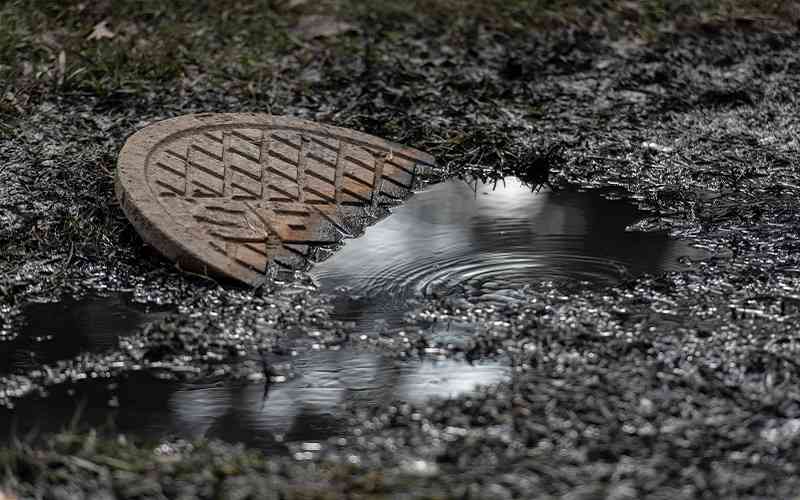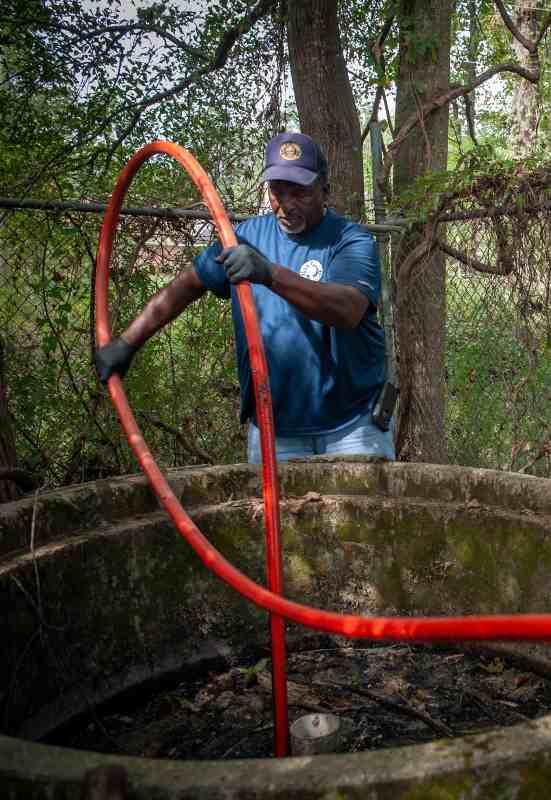
Raw sewage surfaces in the front yard of a home in Jackson, Miss., in October.
14:36 JST, September 1, 2022
The water crisis unfolding in Mississippi’s capital this week has forced schools to shift to virtual learning, led to widespread distribution of bottled water and left Jackson’s mostly Black population without adequate pressure to reliably flush toilets or fight fires.
The crumbling water infrastructure in Jackson – where roughly 150,000 residents were under a boil water notice even before heavy rainfall and river flooding overwhelmed the system this weekend – has been plagued by decades of underinvestment and deferred maintenance.
But it also portends what could soon happen in other U.S. communities, as climate change’s worsening impacts push under-resourced and overburdened water systems to the brink.
“Every public drinking water system in the country is vulnerable to a natural disaster,” said Andrew Whelton, an environmental engineer at Purdue University who has advised utilities and the U.S. Army on water safety issues. “But many are not actually prepared to respond in the way they’re going to need to be.”
Generations-old sewers are routinely overwhelmed by bigger storms. Algae blooms and excess sediment may contaminate reservoirs amid high temperatures and prolonged drought. Rising sea levels can stymie septic systems and cause saltwater to leach into wells. When wildfires destroy water mains and spread chemical contamination, it may take months for drinking water to become safe again.
But experts say the danger is greatest in places like Jackson – low-income communities of color dealing with fragile and failing water infrastructure. A 2019 study reported in the Annals of the American Association of Geographers found that Black, Latino, Native American and Alaska Native households are disproportionately likely to be “plumbing poor.”
“You cannot define structural racism any more clearly than the infrastructure management in this country,” said public policy researcher Andre Perry, a senior fellow at Brookings Institution, a Washington, D.C., think tank.
Unequal water systems “literally lay the groundwork for racial disparities,” he added. And climate change intensifies the harm.
Though Jackson’s water quality struggles date back decades and involve a tug-of-war between state and local officials over responsibility, it was a month of historic rainfall that tipped a persistent problem into the current emergency.
A large, slow-moving storm swelled the Pearl River past flood stage and caused water to spill into the streets. The rainfall and subsequent flooding strained the city’s primary water treatment plant; pump failures compounded the damage, leaving the city unable to provide a steady flow of safe water.
When water pressure drops, as it did in Jackson, it also allows contaminants to get into the system, Whelton said. Floodwaters laden with microbes seep through holes in the pipes. Soil toxins and spilled chemicals can find their way into the drinking supply. When a community’s water infrastructure is old, corroded or exposed to the elements, it becomes that much easier for contamination to leach in.
In Jackson’s system, which contains 1,500 miles of water mains, Whelton said pressure dropped so low that the water wasn’t only unsafe to drink – it could not even reach the ends of pipes.
“That means you have lost complete control of your water system,” he said.
The result has been startling to those outside Mississippi, but not surprising to those who have wrestled with Jackson’s frail system.
“I have said on multiple occasions that it’s not a matter of if our system would fail, but a matter of when our system would fail,” Jackson Mayor Chokwe Antar Lumumba said during a news conference Tuesday afternoon.
Late Tuesday, President Joe Biden approved an emergency declaration for the water crisis in Jackson, which will free up additional federal resources to help state and local officials as they deal with the disaster. The Federal Emergency Management Agency has deployed personnel to the state’s emergency operations center, White House press secretary Karine Jean-Pierre said. Meanwhile, the Environmental Protection Agency will be sending an expert to assess Jackson’s treatment plant and is working to expedite the delivery of any equipment needed for repairs.
The city also announced Wednesday that it would distribute bottled water to residents and provide nonpotable water to use for flushing toilets, washing clothes and cleaning.
But while Jackson’s water struggles are in the national spotlight this week, its situation is not singular. In recent weeks, nearly half-a-dozen 1,000-year rain events have devastated places such as Eastern Kentucky, St. Louis and Dallas.
The American Society of Civil Engineers has raised serious concerns about the nation’s drinking water infrastructure, giving it a C-minus on its latest report card.
“The system is aging and underfunded,” the group wrote in its assessment, noting that there is a water main break every two minutes and an estimated 6 billion gallons of treated water lost each day in the United States – enough to fill over 9,000 swimming pools.
U.S. storm water infrastructure was graded even lower, with engineers warning that few systems could afford the high cost of retrofits to address flooding linked to climate change.
“The need for transformational change in the way we adapt to this challenge has never been more urgent,” Melissa Roberts, executive director of the American Flood Coalition, said in an email.
“We’re now seeing rainfall amounts that previously would have taken several days, in a matter of hours,” Roberts said. “As a result, many of our current storm water systems are overwhelmed.”
It’s not just flooding that can imperil water infrastructure. When the deadliest fire in California history tore through the town of Paradise in 2018, local drinking water became contaminated with cancer-causing benzene and other hazardous substances. Post-fire rainfall flushed ash and burned debris into local lakes and streams, tainting the community’s water sources. Not even home filters were sufficient to remove the pollution, the county health department warned.

City workers try to clear a backed-up sewage pump in Jackson, Miss., last fall.
On the other side of the country, in Lowndes County, Ala., activists say climate change has exacerbated long-standing sewage problems, preventing the ground from absorbing septic tank effluent and causing untreated waste to bubble up into people’s yards and homes. The Justice Department last year launched an investigation into whether the county discriminated against its mostly Black residents by denying them access to adequate sanitation.
Mukesh Kumar, a former Jackson State professor and planning director for Jackson, said cities around the country must contend not only with infrastructure that is aging but that was built to withstand the challenges of an earlier era.
“Now we are suddenly expecting all this infrastructure to perform in more stressful circumstances,” said Kumar, now director of the Waco Metropolitan Planning Organization in Texas.
“The scariest part to me is how much we do not know,” he added. “Even as we are making progress in understanding climate change and its impacts, we still can’t pinpoint the vulnerabilities in every system.”
At the same time, Kumar said, more and more communities are working to make their water and sewer systems more resilient in a way that didn’t happen in the past. And new spending by Congress will bolster those efforts.
“This is a uniquely wonderful resource,” and one that comes at a critical time, he said.
The Bipartisan Infrastructure Law passed last year provided the EPA with more than $50 billion to upgrade storm water and sewer systems, protect waterways from climate-related threats, replace damaged or dangerous service lines and make other water infrastructure improvements. In a letter instructing governors to focus their efforts on disadvantaged areas, EPA Administrator Michael Regan specifically cited Jackson as a city in need of support.
This year’s Inflation Reduction Act provided a further boost to water systems, including funds to improve water access in vulnerable communities, prevent storm water runoff and mitigate drought.
But Whelton, the environmental engineer, said governments still don’t invest enough in the human aspects of disaster management, such as training for utility managers and technical assistance for systems in turmoil.
“Most people like to repair pipes and take photo ops,” he said. “But when it comes time to making decisions about an ongoing disaster, the resources aren’t always there.”
For now, the acute crisis in Jackson remains, with no end in sight.
“This is our reality,” said De’keither Stamps, who represents Jackson in the state legislature. “We’ve been in a constant state of emergency for a long time.”
Stamps said there is “enough blame to go around” for how the city found itself in such dire straits. But blame and dysfunction won’t address the current problems – and those that likely lie ahead, he said.
“Leadership at every level should be working together more, from local to state to federal,” Stamps said. “We can’t allow tragedy to happen and move beyond it without serious investment to solve it.”
Top Articles in News Services
-

Survey Shows False Election Info Perceived as True
-

Prudential Life Expected to Face Inspection over Fraud
-

Hong Kong Ex-Publisher Jimmy Lai’s Sentence Raises International Outcry as China Defends It
-

Japan’s Nikkei Stock Average Touches 58,000 as Yen, Jgbs Rally on Election Fallout (UPDATE 1)
-

Japan’s Nikkei Stock Average Falls as US-Iran Tensions Unsettle Investors (UPDATE 1)
JN ACCESS RANKING
-

Japan PM Takaichi’s Cabinet Resigns en Masse
-

Japan Institute to Use Domestic Commercial Optical Lattice Clock to Set Japan Standard Time
-

Israeli Ambassador to Japan Speaks about Japan’s Role in the Reconstruction of Gaza
-

Man Infected with Measles Reportedly Dined at Restaurant in Tokyo Station
-

Videos Plagiarized, Reposted with False Subtitles Claiming ‘Ryukyu Belongs to China’; Anti-China False Information Also Posted in Japan
























